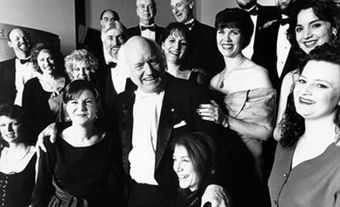Children endowed with phenomenal intellectual and technical abilities which enable them to function, in art or science, as adults. A child may be bright or appealing - or cleverly exploited - without being a prodigy. Among Canadian musicians there are many who gave recitals at six or seven, but often, on the evidence extant, it is difficult to be certain whether these offered ordinary beginners' programs performed neatly or advanced music performed with mature authority.
Possibly the first Canadian to be considered a prodigy was Tom Haliburton (b probably at Annapolis Royal, NS, 18 Jan 1821, d Massachusetts 3 Nov 1847), son and namesake of the author of the famous Sam Slick novels. Haliburton studied music in Germany and was known among his friends as 'the American Mozart.' Other prodigious Canadian children have included Clermont Pépin, who at eight began to compose a symphony for piano four-hands; and André Mathieu, who gave his first piano recital at six and had his earliest piano compositions published shortly thereafter.
Among Canadian pianists, Willy Eckstein was known at 12 as 'The Boy Paderewski,' and Ellen Ballon at six passed the AB of the RSM and RAM exams. Other piano prodigies include Gilles Breton of Quebec City; Winnipeg-born Valdine Conde, who made her debut (1938) at nine with the New York Civic Orchestra playing Saint-Saëns' Concerto in G Minor; Toronto-born Muriel Albert, who was composing at three and whose appearance at 12 (ca 1944) as a pianist with the Buffalo Philharmonic won 10 curtain calls; Glenn Gould, who read music at three, composed at five, and completed an ATCM at 12; Stewart Goodyear (b Toronto 1978), who first appeared with the TS in 1990 and who has also displayed talent as a composer; Marian Grudeff; Vancouver-born (ca 1946) Andrea Kalanj, who played Beethoven's Concerto No. 3 with the Vancouver Symphony Orchestra at nine; Angela Hewitt; Diedre Irons; Elaine Keillor, who gave her first public performance before she was three and completed her ARCT at 11; Muriel Kerr; Minuetta Kessler; Mari-Elizabeth Morgen; Jon Kimura Parker, Patricia Parr; Berthe Roy, and Jean-Alexandre Sarrazin. The jazz pianists Chris Gage, Oscar Peterson, and Doug Riley, all of whom showed phenomenal abilities while very young, might also be considered prodigies. Ernest MacMillan began organ study at eight and made his debut shortly thereafter.
Emma Albani made her debut as a singer, pianist, and harpist at eight, and an international career was predicted for her when she was 14. The boy soprano Bobby Breen (b Jackie Boreen, Toronto 1927, d England 1972) sang in Jack Arthur's Toronto revues, appeared at nine on Eddie Cantor's CBS radio show, and performed until 1942 in Hollywood films - he recorded for Decca, Bluebird, and other labels and spent his later career working in US nightclubs. Another boy soprano, Gérard Barbeau (1936-1960), sang at 12 on Montreal radio and in his mid-teens gave recitals of arias and art songs which brought comparisons to Erna Sack and Lily Pons. (Soon afterwards, he entered the priesthood.) The soprano Marie Gauley, at three, won five firsts at the Kiwanis Festival. Other singers, including Deanna Durbin, Jackie Rae, and René Simard, have enjoyed highly successful childhood careers.
Two of Canada's 19th-century violin prodigies were Flavien Sauvageau (son of Charles) and George Fox, who at six drew astonished praise from Eduard Reményi. In the 20th century Arthur LeBlanc and Noël Brunet made early debuts, as did Donna Grescoe and Betty-Jean Hagen. Kayla Mitzel (or Mitzl) (b Winnipeg 1915) was a pupil of Géza de Kresz and Louis Persinger and greatly successful as a child in concerts in Europe and the USA. Betty-Ann Fischer (b Kitchener, Ont, 1925, d Wiarton, Ont 1979) overcame finger deformation to give her first violin recital at six and play the Mendelssohn Concerto with the TSO at 11. Later, as Betty-Ann Fischer-Byfield, she was a member of the TS. Corey Cerovsek, James Ehnes, Marc-André Gauthier, and Victor Schultz have been among later 20th-century violin prodigies. The cellist Lorne Munroe, whose teacher Dezsö Mahalek was a prodigy in Europe, won the senior cello class of the Manitoba (Winnipeg) Music Competition Festival at 10, and Shauna Rolston began performing in public at six. Foreign-born Canadian musicians who were prodigies include Rex Battle, S.C. Eckhardt-Gramatté, Ofra Harnoy, Anton Kuerti, and Leo Smith.

 Share on Facebook
Share on Facebook Share on X
Share on X Share by Email
Share by Email Share on Google Classroom
Share on Google Classroom

